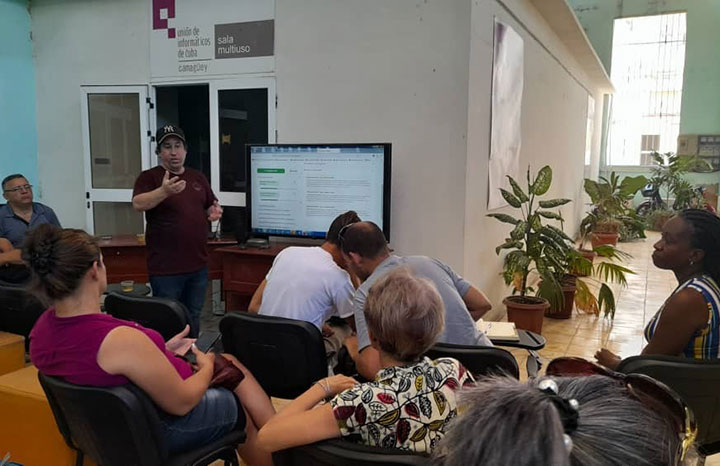
Camagüey, August 15.- The importance Fidel Castro placed on the development of computer science in the country was highlighted during the Digital Transformation Event being carried out by the Cuban Computer Scientists Union (UIC, for its acronym in Spanish) in Camagüey until August 23, as part of the activities commemorating the Commander in Chief's 99th birthday.
On August 13, the birth date of the historic leader of the Cuban Revolution, members of the social organization opened the event, which focused this time on emerging technologies such as Artificial Intelligence (AI). They joined the tributes on the occasion of the launch of a broad program leading up to Fidel's centennial in 2026.
Computer scientists from Camagüey are the depositaries of a work that makes them increasingly committed to the advancement of this field and technologies in general, based on numerous projects promoted by Fidel, principal architect of the first existing computer in Cuba, the Youth Club of Computing and Electronics, and the University of Computer Sciences.
His great legacy has transcended even the UIC, as was confirmed during the meeting, where participants reaffirmed their willingness to continue promoting these ideas based on current development programs.
This Wednesday, the Camagüey Event for Digital Transformation, held at the UIC headquarters in this city, featured the presentation of an AI system based on RAG-Fusion and local LLM, with applications in the Tourism and Heritage sectors.
The contextual AI, whose author is Reynier Hernández Palacios, member of the UIC and active collaborator of the innovation ecosystem co-Lab, could be a project driving the Strategy for social economic development in the region, aligned with the Cuban Digital Agenda and the Strategy for the development of AI on the island, as explained by specialists at the event.
The aforementioned system has multisectoral applications that contribute to economic efficiency and constant improvement in public administration management, assisting in rapid, reliable decision-making with verifiable sources.
Its presentation within the co-Lab ecosystem and its specialized AI node seeks to promote digital innovation through the agile co-creation of minimum viable products for the regional business system and other service entities, as well as training evaluators to validate knowledge bases, through the coordination of development actors with public, private, or public-private initiatives of the multiple interested parties.
The presentation of the innovative system was attended by Grisel Aurora Santana, director of museums at the National Council of Cultural Heritage; Yanela Céspedes Basulto, director of the Provincial Council of Heritage in Camagüey; Seydel Bueno, dean of the Faculty of Computer Science and Exact Sciences at the University of Camagüey; and Odalmis Martín Fuentes, from the Provincial Council of the local branch of the Union of Cuban Historians.
Another highlight of the event held by the UIC in the region was a business networking event with the participation of provincial and municipal company executives, where they evaluated the potential for applying emerging technologies, primarily AI, to improve their production processes.
Representatives from eight companies and other entities from the territory attended, including the Provincial Council of Heritage, the University of Camagüey, the Government's Computer Science and Local Development Directorates, the Union of Cuban Historians, and the Provincial Education Directorate. (Source: ACN)